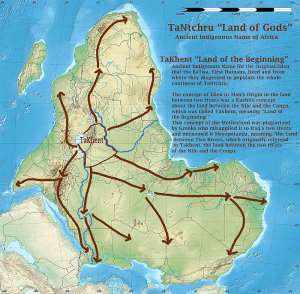
The original Kushite-Kemetic name of "Africa" was TaNtchru pronounced TaNeteru. This means "Land of Deities" or "Land of Gods." The specific region they considered to be the origin of mankind is called TaKhent. It is the land between the Nile and Congo Rivers. The original Mesopotamia (Land Between Two Rivers) is TaKhent, which is the true origin of human civilization, not West Asia's Mesopotamia.
TaKhent was originally founded by the BaTwa (misnamed Pygmies by racist Europeans). The name BaTwa means "Divine Self Lands." Because this reference to "lands" is referring to the people and not actually the land, the meaning of BaTwa is confusing in such a barbaric language as English, so let's break it down to understand The First Ancestors.
The word "Ba" in Kushite-Kemetic means "Divine Self." The Ba is also the highest of the 9 aspects of a person's Total Being (Ka, Ab, Ba, Akh, Sekhem, Sahu, Ren, Khaibet, Khet). Some confuse the akh as higher; while it represents the soul's reincarnating ability in "afterlife"; the Ba is the highest achievement in this life as a union with the heavenly self. The achievement of the manifestation of the godman/godwoman.
As a reference to the man who develops himself into the Ba, it became a term for an Honorable Father. Ba and Baba are still very common words for father (both genetic and as a community leader) in Africa and African derived Afroasiatic languages. The term Ba is the prefix in the word "Bantu" which Europeans try to translate as "people." But Bantu does not mean "people" as in humans but specifically Ba-Ntu (Ba-Ntchru), meaning Divine Self Deities. The Original Bantu were calling themselves GODS. The European completely flipped the truth by claiming the Bantu are recent migrating people (just because they are so widespread over half of Africa), when in fact the Bantu are one of the oldest people on Earth.
The word Twa in Kushite-Kemetic means "lands" (often also mistransliterated as Tawi or Taui to hide the Twa connection). As in the common Kemetic phrase "Sema Twa" (Union of the Lands)." European minded people will be confused as to why the First People referred to themselves as Twa (Lands). They were in union with the land to the point they considered themselves the very land itself, a concept common in Africa and pre-Columbian America, but foreign and confusing to the anti-earth Christian-Islamic mind.
Thus the term BaTwa cannot be properly translated in European languages grammatically because European languages don't have the concept of humans being land itself. Europeans add suffixes like " Japan-ese, Engl-ish, Rom-an, Niger-ian," to refer to people OF lands. But in Africa, such suffixes were not typically used because the citizen of a nation did not see himself as "from" the land, but the land itself. In traditional African grammar, one would say, I am Africa. Not, I am African. This is how the First Ancestors, the BaTwa, came up with their name.
The people of Kemet saw TaKhent as the holiest place on Earth and considered the BaTwa as the masters of medicine. For this reason, the BaTwa was divine in Kemetic eyes to the point that the deity Bes is the literal deification of the BaTwa people. One could not be crowned Nsut-Bity (pharaoh) or Qo-Re unless a BaTwa sacred physician performed the Ancestral Bes dance at your coronation.




 We’ll protect state wealth from opaque deals – Prof Jane Naana
We’ll protect state wealth from opaque deals – Prof Jane Naana
 Mauritania president says running for second term in June polls
Mauritania president says running for second term in June polls
 I won't ever say I was a mere driver’s mate' — Prof. Opoku-Agyemang
I won't ever say I was a mere driver’s mate' — Prof. Opoku-Agyemang
 2024 polls: 'EC struggling to defend credibility'— Prof. Opoku-Agyemang
2024 polls: 'EC struggling to defend credibility'— Prof. Opoku-Agyemang
 Akufo-Addo gov't's 'greed, unbridled arrogance, unrestrained impunity, sheer dis...
Akufo-Addo gov't's 'greed, unbridled arrogance, unrestrained impunity, sheer dis...
 Election 2024: Ghana needs an urgent reset, a leadership that is inspiring – Ma...
Election 2024: Ghana needs an urgent reset, a leadership that is inspiring – Ma...
 Partner NDC to rollout a future of limitless prospects – Prof Jane Naana Opoku-A...
Partner NDC to rollout a future of limitless prospects – Prof Jane Naana Opoku-A...
 NPP will remain in gov’t till Jesus comes — Diana Asamoah
NPP will remain in gov’t till Jesus comes — Diana Asamoah
 Sunyani Technical University demands apology from former SRC president over sex-...
Sunyani Technical University demands apology from former SRC president over sex-...
 'Dumsor' was resolved by Mahama but ‘incompetent' Akufo-Addo has destroyed the g...
'Dumsor' was resolved by Mahama but ‘incompetent' Akufo-Addo has destroyed the g...
